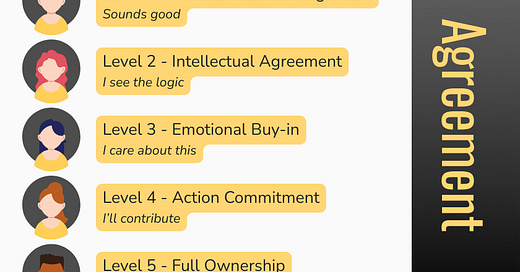Imagine you were presented with a statement about a humanitarian issue…
“We should do something about the lack of clean drinking water in that part of the world.”
If you were to say “I agree” in response to this statement, you might be saying that people in general in our society should be helping out the society with the water issue. Alternatively, you might be saying that you and the person you’re speaking with should pack a bag immediately and head over there to do something about it.
A simple lack of alignment over the definition of “we” in that sentence can create a fundamental misunderstanding over what your agreement means.
Clarity Is Everything
Effective leaders and facilitators understand this ambiguity (and watch for it like hawks). Rather than asking "Do we agree?" they specify exactly what agreement means in each context using detailed, closed (yes/no) questions…
"Are you confident this is the right approach?"
"Are you willing to personally contribute resources?"
"Can you actively champion this decision with your team?"
They then follow those questions up with more open questions in order to pressure-test their understanding of the agreement…
“How do you know this is the right approach?”
“What level of personal contribution do you envisage?”
“How will you be helping your team understand and buy-in to this decision?”
Agreement vs Alignment
Faced with a particular situation…
consensus means that the proposed action is the thing that everyone involved would choose to do
consent means that the proposed action may not be what everyone involved would choose to do independently … but none of them have a strong enough reason to block it
In our Decision Making & Accountability workshop, we go into depth about why teams should almost never use the consensus approach as it often leads to organizational paralysis. That trap is so easy to wander into because people use the word “agree” colloquially.
This is why we recommend that people get used to saying “agree” when they mean consensus and “align” when they mean consent. It might feel a bit ‘corporate’ to do the latter but this is one of the few examples of a piece of ‘work-speak’ that are both simple to adopt and tend to have a large, positive impact on clarity.
PS…
If, like us, you have a general dislike of corporate-speak, you might find this gives you a good chuckle.




